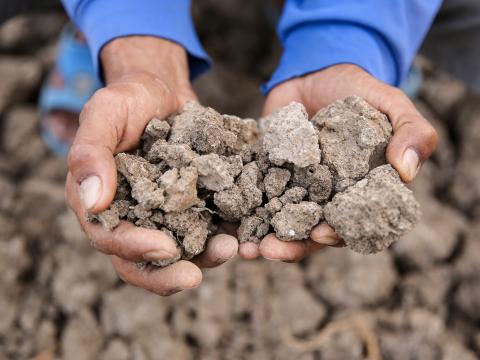Sustainable farming empowers Moeun Sameth’s family amidst climate change

CLIMATE CHANGE: A DIRECT THREAT TO CAMBODIA’S MOST VULNERABLE.
Extreme. This is the best adjective to qualify the weather patterns in Cambodia’s modern history. The Southeast Asian country recently experienced record-high temperatures in May, as a result of an El Niño event. This meteorological phenomenon generated historical droughts, directly affecting a population that relies heavily on agriculture and fisheries (25% of GDP, 49% of employment of the country’s labour force)1. In the communities served by World Vision International - Cambodia alone, over 360,000 individuals were directly affected by the droughts. Water scarcity, economic impact on smallholder farmers and essential services disruptions (school time changes, health centres capacities) were the major consequences faced by the communities of ten provinces where World Vision operates.
Kampong Speu province was no exception. One of the driest provinces in Cambodia, Kampong Speu regularly experiences extended dry seasons, limiting water availability for irrigation. These dry spells have become more intense and frequent with global warming, lowering agricultural yields and raising the probability of crop failure.
“Every day was a battle,” recalls Mr. Sameth. “The unpredictability of the weather, the scarcity of resources, and the constant threat of pests and diseases made each harvest a gamble. But I knew I had to persevere for the sake of my family.”
The 45-year-old farmer and father of six is a resident of Samrong Tong district, in Kampong Speu province. He is categorized as IDPoor 2 by the government, meaning his poverty level grants him access to free services (e.g. health care). With extreme weather conditions resulting from climate change, agricultural yields are increasingly unpredictable leaving him and his family at risk of shocks that affect their livelihood and overall well-being.
SUSTAINABLE FARMING BRINGS LIGHT IN SAMETH’S LIFE
World Vision International in Cambodia (WVI-C), in collaboration with local authorities and the Provincial Department of Agriculture, launched a sustainable agriculture initiative in Samrong Tong district. Recognising Sameth as one of the most vulnerable farmers in the area, they extended their support to him through capacity-building workshops and financial aid. By focusing on climate-smart agriculture (CSA), WVI-C provides a holistic approach that equips farmers with essential knowledge and skills that strengthen their farming techniques and ultimately foster resilience and sustainability in the face of evolving climate challenges. This support includes the construction of greenhouses, bio-fertilizer workshops, crop rotation and diversification; but also access to financial services and market linkages through agriculture cooperatives and producer groups that contribute to the sustainable success of farmers like Sameth.
“The greenhouse was a game-changer,” says Mr. Sameth. “It allowed me to control the environment in which my crops grew reducing the impact of external factors and significantly increasing my yield.”
The impact of Mr. Sameth’s transition to sustainable agriculture was profound and far-reaching. He was able to diversify his crops and reduce pest-related losses resulting in significant increases in his crop yield and income. The Chinese cabbage, Pak Choi, green mustard, and morning glory that are growing in his greenhouse offer a new source of healthy food for his family and a regular income. His success reverberated beyond his own farm, inspiring neighbouring farmers to adopt similar practices and fostering a sense of resilience and solidarity within the community.
“ As farmers, we are the custodians of the land. It’s our responsibility to nurture it, to protect it, and to ensure its sustainability for future generations”, says Sameth.
CLIMATE-SMART AGRICULTURE PROGRAMME IMPACT
The climate-smart agriculture activities have already impacted the lives of:
- 16,450 girls and boys
- 7,796 households
- 2,849 smallholder farmers
Sameth’s journey is a testament to the transformative power of sustainable agriculture in addressing climate challenges and improving the livelihoods of vulnerable rural communities. His story serves as a beacon of hope for farmers facing similar struggles, underscoring the importance of adaptation, innovation, and community collaboration in building resilient agricultural practices.
As Cambodia navigates the complexities of a changing climate, Mr. Sameth’s success story offers a blueprint for a sustainable and prosperous future. His tale of resilience and transformation serves as a reminder that even in the face of adversity, it is possible to sow the seeds of change and reap the fruits of success.